Water, Sanitation, and Hygiene (WASH)
In the heart of our humanitarian efforts lies a commitment to ensuring the fundamental rights to clean water, proper sanitation, and good hygiene practices. In Ethiopia, where 60 to 80 percent of communicable diseases are attributed to limited access to safe water and inadequate sanitation and hygiene services, and where 50 percent of the consequences of undernutrition are caused by environmental factors, our Water, Sanitation, and Hygiene (WASH) initiatives become not just interventions but vital lifelines for communities in need.
At IHS Ethiopia, our WASH programs form a cornerstone in our mission to uplift communities facing crisis and disadvantage. Over the budget years spanning 2020-2023, we have reached more than 100,000 individuals, providing access to pure drinking water that meets the Sphere standards for both normal and emergency contexts.
Our endeavors extend beyond water access; we recognize the interplay between improved water infrastructure, sanitation facilities, and heightened hygiene practices in fostering community well-being. From constructing communal pit latrines to implementing hygiene promotion activities, our initiatives aim not only to address immediate needs but also to instill lasting habits that prevent the spread of diseases.
Join us on our journey as we delve into the details of our WASH projects, from emergency latrine construction in response to crises, to the installation of water tanks and boreholes that stand as symbols of resilience and progress. At [NGO Name], we believe that WASH is not just a set of interventions; it is a catalyst for health, dignity, and the empowerment of communities.
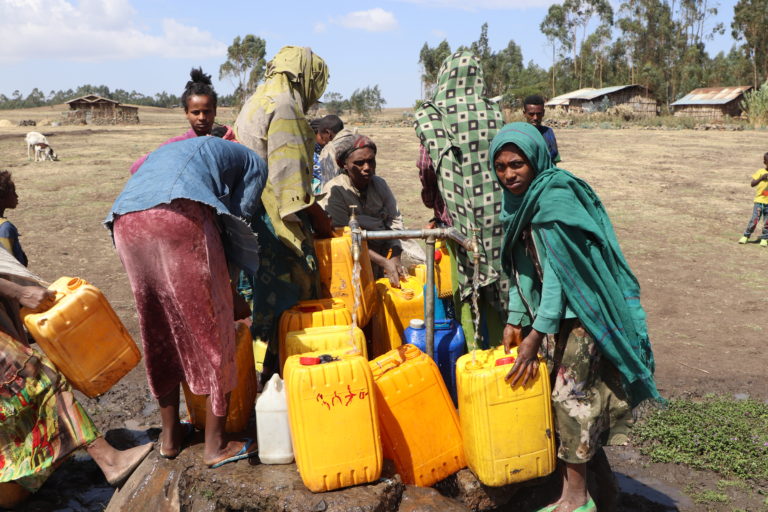
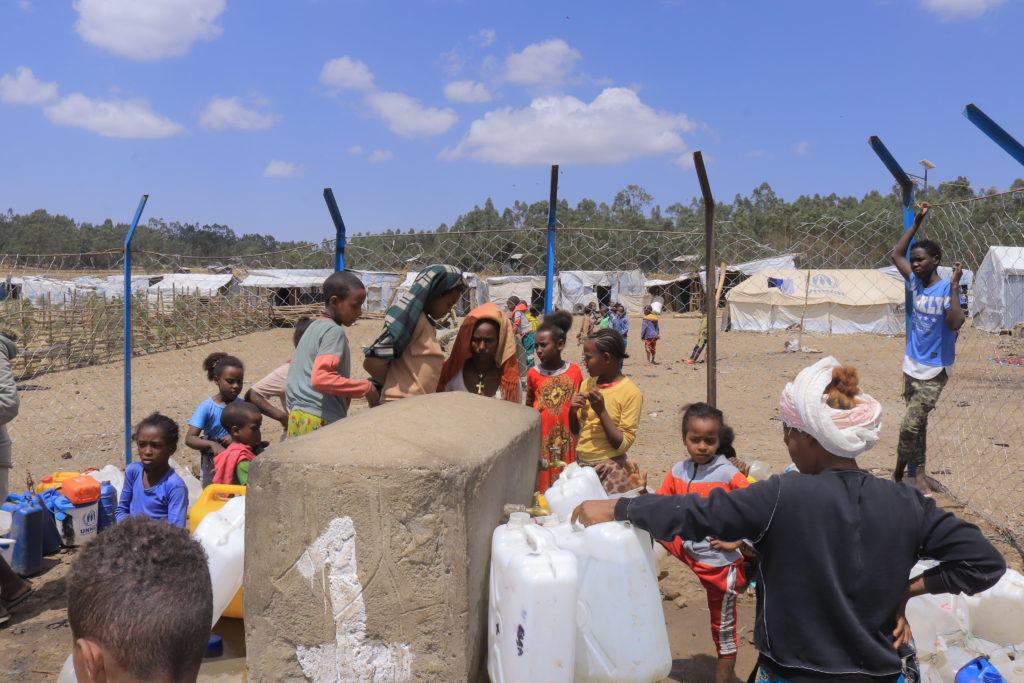
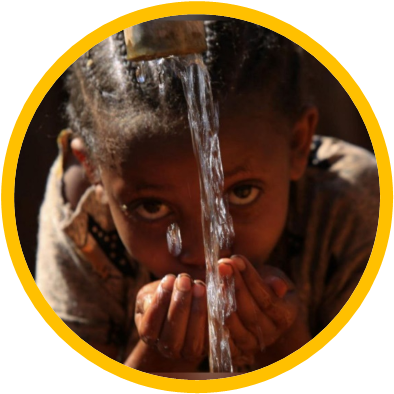
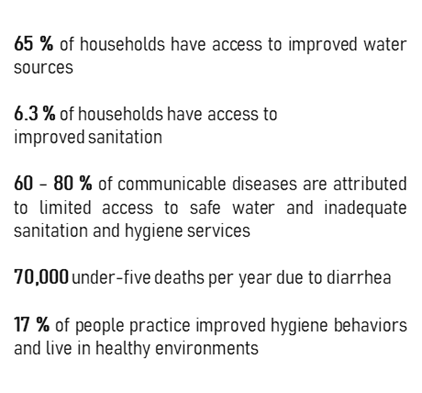
-Water System Management-
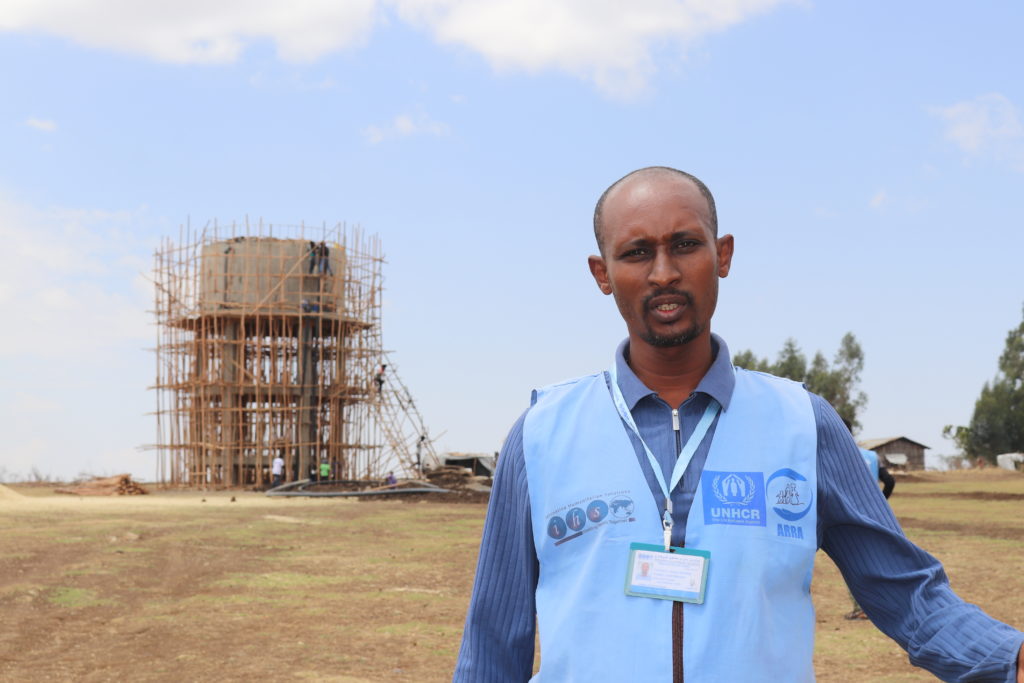
Access to safe and clean water is a fundamental human right, yet millions of people around the world lack this essential resource. In Ethiopia, the scarcity of clean water has led to numerous challenges, including communicable diseases and undernutrition. At IHS Ethiopia, we are dedicated to changing this reality by bringing sustainable water systems management to those in need.
We understand that safe water is not a luxury but a necessity, and our efforts are aligned with the Sphere standards, ensuring that individuals receive at least 20 liters per person per day in normal circumstances and 15 liters per person per day in emergencies.
Our approach encompasses various aspects of water systems management, including water tank installation, borehole drilling and rehabilitation, water trucking, and water point construction. By implementing these measures, we not only ensure access to potable water but also promote hygiene practices and reduce the risk of communicable diseases within the communities we serve.
We at IHS firmly believe that access to clean water is a basic human right, and we are committed to providing sustainable solutions for water systems management that positively impact the lives of individuals and entire communities.
Water Trucking
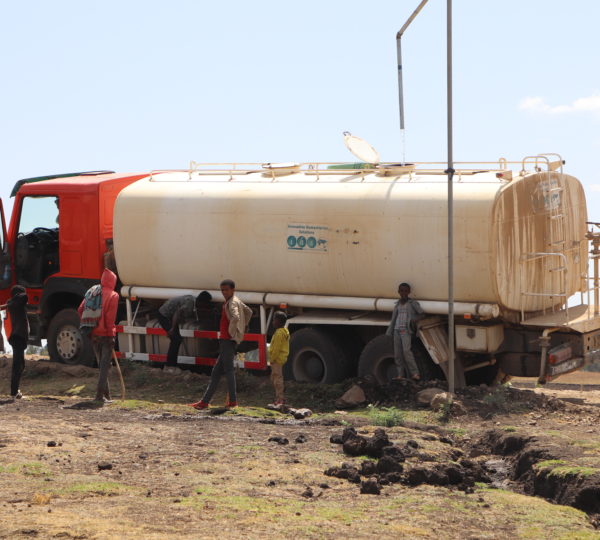 Water scarcity is a prevalent issue in many regions, and IHS Ethiopia is actively addressing this challenge through our Water Trucking initiative. Our organization has implemented this program to significantly increase water coverage and improve daily access to clean water.
Water scarcity is a prevalent issue in many regions, and IHS Ethiopia is actively addressing this challenge through our Water Trucking initiative. Our organization has implemented this program to significantly increase water coverage and improve daily access to clean water.
Our dedicated efforts have resulted in the installation of water tanks with a capacity of 25,000 liters at the Alemwach refugee site and water tanks with a capacity of 10,000 liters in temporary settlements for Eritrean refugees in the Northern Gondar, Amhara region. These strategically placed tanks ensure that both refugees and the host community have access to clean water, serving the needs of over 25,000 individuals.
With support from generous partners like RRS and the European Union, we’ve extended our reach even further. We’ve installed water tanks with pipeline systems capable of reaching and serving 11,000 host communities in the Alemwach refugee site area. Our water trucking program ensures that clean water is delivered to those who need it most, significantly improving daily water access.
Our commitment to this endeavor is unwavering, and the impact is evident. Currently, our Water Trucking initiative delivers an average of 896,930 liters of standard water provision daily to benefit more than 55,000 individuals. This initiative is a lifeline, providing a valuable resource for countless communities.
Water Tank Installation
In the pursuit of ensuring access to safe and clean water, HIS Ethiopia takes a multifaceted approach, and our Water Tank Installation initiative plays a crucial role in achieving this goal. Access to potable water is a fundamental human right, and our organization is dedicated to making it a reality for communities in need.
Since 2020, we have made significant strides in our mission. HIS Ethiopia has installed water tanks with a capacity of 25,000 liters at the Alemwach refugee site. These strategically placed tanks serve as reservoirs of hope, providing access to clean water for thousands of individuals.
Furthermore, we have installed water tanks with a capacity of 10,000 liters in temporary settlements for Eritrean refugees in the Northern Gondar, Amhara region. These tanks are not only critical for refugees but also benefit the nearby health center with water system installations that can serve both the refugee and host communities.
Thanks to the support from our generous partners, including RRS and the European Union, HIS Ethiopia has expanded its impact. We’ve installed water tanks with pipeline systems capable of reaching and serving 11,000 host communities in the Alemwach refugee site area. This ensures that even more individuals have access to clean water, transforming their lives and contributing to their well-being.
Our Water Tank Installation program is a testament to our commitment to providing communities with a valuable resource that is essential for life. Clean water is not just a convenience; it’s a necessity, and we are determined to deliver it.
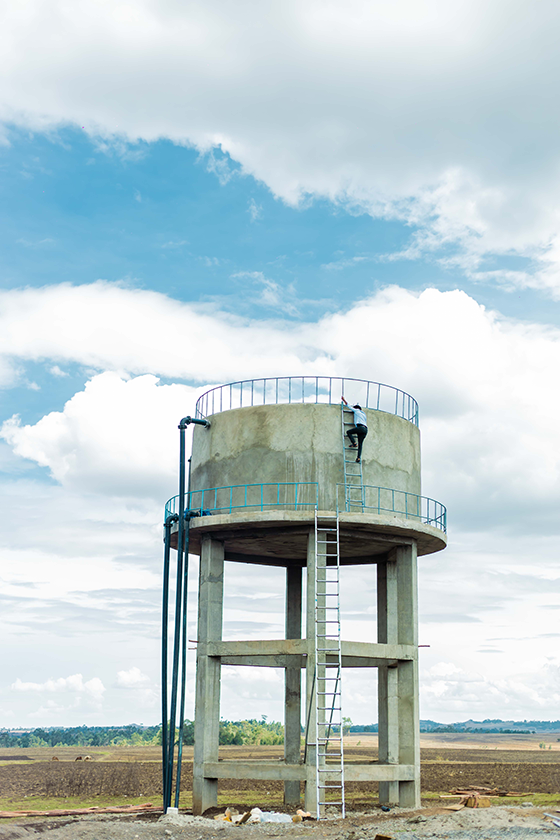
Borehole Drilling and Rehabilitation
Access to clean and reliable water sources is a lifeline for communities, and HIS Ethiopia is dedicated to enhancing this lifeline through our Borehole Drilling and Rehabilitation program. Our organization recognizes the vital importance of boreholes to our goal of providing access to safe water to as many people as possible.
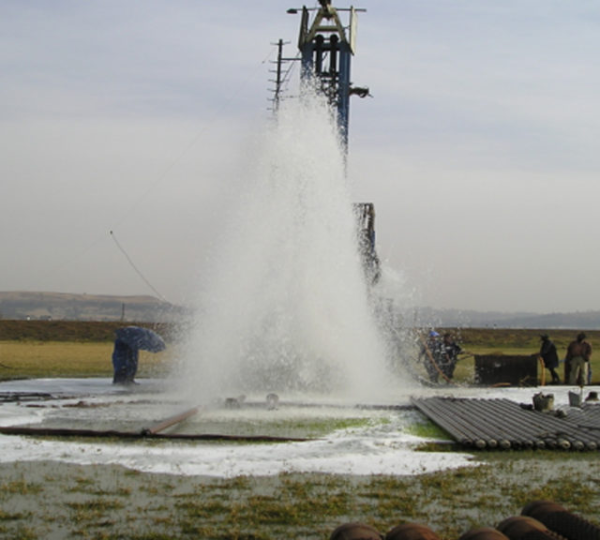
Our commitment to borehole drilling and rehabilitation has yielded significant results. We have successfully drilled two boreholes in the establishment of the Alemwach refugee site in Northern Gondar, Amhara region. These boreholes have provided a reliable source of clean water, contributing to the health and well-being of the community.
But our efforts go beyond drilling. We understand the importance of maintaining and rehabilitating existing boreholes to ensure a continuous supply of clean water. Monitoring water quality on a daily basis is a routine part of our work, guaranteeing that the water remains safe for consumption.
Boreholes are an essential part of our mission to improve water access and sanitation. They are a testament to our dedication to fostering healthier and more resilient communities.
IHS Ethiopia is committed to making a difference in the lives of those who rely on boreholes for clean water. Our work goes beyond drilling and rehabilitation; it’s about providing a reliable source of hope and health.
Water Point Construction
Access to clean water is a fundamental human right, and HIS Ethiopia is committed to making this right a reality for communities through our Water Point Construction program. We believe that clean and safe water should be accessible to all, and our initiatives are a testament to this belief.
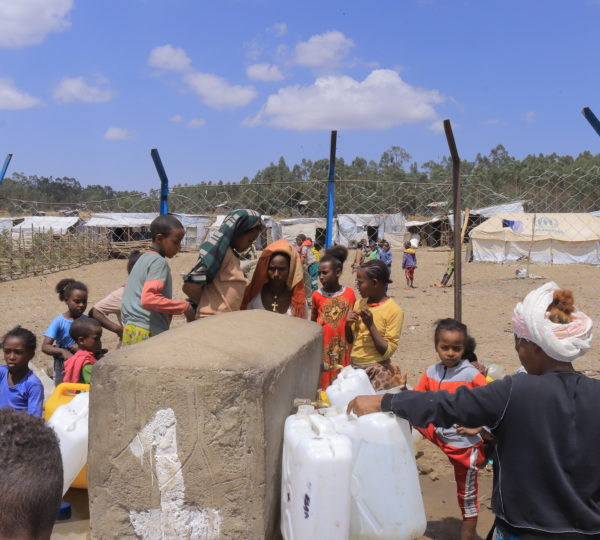
Over the years, we have undertaken significant efforts to construct water points in key areas, ensuring that communities have access to this vital resource. Water points serve as lifelines, providing clean water for drinking, cooking, and maintaining good hygiene.
At HIS Ethiopia, we understand the critical role that water points play in enhancing the well-being of communities. We are dedicated to ensuring that individuals, especially in areas with limited access to safe water, have convenient access to clean and safe water sources.
Our Water Point Construction program goes hand in hand with our broader mission of fostering healthier and more resilient communities. We believe that by providing clean water access, we contribute to improving the quality of life for countless individuals.
HIS Ethiopia is committed to making a difference by constructing water points that are essential for the well-being of communities. Our work is more than just construction; it’s about transforming lives and providing relief.
Access to clean and reliable water sources is a lifeline for communities, and IHS Ethiopia is dedicated to enhancing this…
Access to clean water is a fundamental human right, and IHS Ethiopia is committed to making this right a reality…
In the pursuit of ensuring access to safe and clean water, IHS Ethiopia takes a multifaceted approach, and our Water…
Water scarcity is a prevalent issue in many regions, and IHS Ethiopia is actively addressing this challenge through our Water…
-Sanitation and Hygiene-
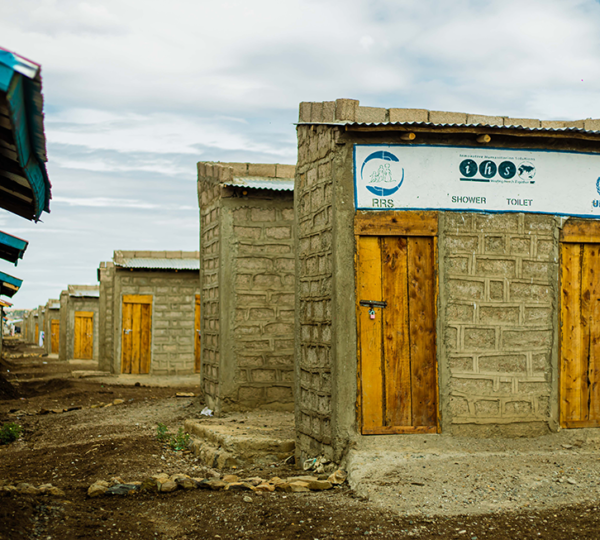 Sanitation and hygiene are critical aspects of public health and well-being, and at IHS Ethiopia, we are dedicated to improving these vital areas in underserved communities. In Ethiopia, where limited access to sanitation and poor hygiene practices contribute to communicable diseases and undernutrition, our organization is working tirelessly to bring positive change.
Sanitation and hygiene are critical aspects of public health and well-being, and at IHS Ethiopia, we are dedicated to improving these vital areas in underserved communities. In Ethiopia, where limited access to sanitation and poor hygiene practices contribute to communicable diseases and undernutrition, our organization is working tirelessly to bring positive change.
One of our significant achievements has been the construction of 140 communal pit latrines and 202 blocks of latrines in the Alemwach Refugee site in Northern Gondar, funded by UNHCR in the 2021 and 2022 budget years. These facilities are accompanied by awareness-raising training for community leaders and beneficiaries on proper sanitation practices.
In April 2023, in the wake of conflict and population displacement, we responded swiftly by constructing twenty-three blocks of communal latrines with six seats each at the Metema Yohannes transit site and Kumer refugee site in Metema. Additional two blocks of communal latrines were also built at the Gendawuha hospital and CDC center in Western Gondar to address a cholera outbreak. These efforts have significantly improved sanitation facilities for an estimated 12,000 individuals.
Dignity is a core principle of our work, and we actively distribute dignity kits to 500 refugee women and girls in need, in collaboration with UNHCR, RRS, and SIF. These kits include essential items to ensure personal hygiene and dignity. Our WASH programs also include awareness and education. We distribute hygiene kits containing washing basins, 20-liter jerry cans, multipurpose soaps, sanitary pads, liquid hair oil, underwear, and ladies’ dresses. Additionally, we focus on cholera outbreak prevention, including the installation of hand-washing basins with a 240-liter capacity and the creation of awareness campaigns to prevent outbreaks.
At IHS Ethiopia, we firmly believe that improving sanitation and hygiene practices is a fundamental step towards healthier communities, and we remain committed to making this a reality for those we serve.
Proper hand hygiene is a fundamental aspect of maintaining good health, and IHS Ethiopia is dedicated to promoting this essential…
Proper hand hygiene is a fundamental aspect of maintaining good health, and IHS Ethiopia is dedicated to promoting this essential…
In times of crisis, ensuring proper sanitation facilities becomes a top priority, and IHS Ethiopia is committed to providing immediate…
Get In Touch
- +251913600287
- info@ihsethiopia.org / contact@ihsethiopia.org
- Bole, Addis Ababa, Ethiopia
Copyright © 2024 CHERER CREATIVE AGENCY

